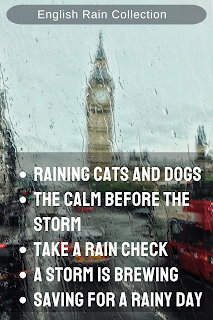Exploring the Origins and Meanings of 5 Common Idioms
Raining Cats and Dogs
The idiom "raining cats and dogs" means to rain heavily, and is one of the most well-known weather-related idioms in English. The origin of this expression is uncertain, but there are a few theories. One is that in the past, animals such as cats and dogs would seek shelter in thatched roofs, and when it rained heavily, they would fall out of the roof and appear to be raining from the sky. Another theory is that the phrase may have originated from the old English word "catadupe," meaning a waterfall.
The Calm Before the Storm
This idiom describes a period of relative peace or quiet before a period of trouble or difficulty. The phrase likely originated from nautical terminology, where sailors would experience a lull in wind and waves before a storm hit. The calm before the storm can also be used to describe a sense of impending danger or trouble in a non-literal sense.
Take a Rain Check
The phrase "take a rain check" means to decline an offer or invitation but suggest that it may be taken up in the future. The expression likely comes from the practice of issuing tickets to baseball games that would be valid for a future date in case the game was rained out. The use of "rain check" has since expanded to include any offer or invitation that cannot be accepted at the time.
A Storm Is Brewing
This idiom describes a situation in which there is trouble or conflict on the horizon. The phrase likely comes from the sense of anticipation and anxiety that comes before a storm. It can be used in a literal or figurative sense, to describe either an actual impending storm or a metaphorical one, such as a brewing conflict or crisis.
Saving For a Rainy Day
This idiom means to save money or resources for use in a future time of need or difficulty. The expression likely originated in agrarian societies, where farmers would save grain or other crops during times of plenty to ensure that they had enough food to survive in times of drought or other hardship. The phrase has since been adapted to describe the importance of financial planning and saving for unexpected expenses or emergencies.
In conclusion, these five idioms demonstrate how English speakers use language to describe and interpret the many forms and effects of rain. Each expression has its own unique origin and history, but all of them share the common thread of describing the impact of rain on our lives and surroundings.
If you're interested in expanding your knowledge of English idioms and phrases, we highly recommend checking out the "English Phrase Collection" YouTube channel. The channel has a wealth of informative and engaging videos that explore a wide range of common English expressions, including those related to weather, like the "English Rain Collection."
By watching these videos, you'll learn how to use them correctly in conversation. Whether you're a native English speaker looking to improve your language skills or a non-native speaker seeking to expand your vocabulary, the "English Phrase Collection" channel is an excellent resource. So why not give it a watch and see what you can learn?


No comments:
Post a Comment